Croatia Logs 3,778 New Coronavirus Cases, 54 Deaths
ZAGREB, 17 Dec 2021 - Croatia has registered 3,778 new coronavirus cases and 54 COVID-related deaths in the last 24 hours, the national coronavirus response team reported on Friday.
Currently, there are 23,931 active cases in the country. Among them are 2,188 infected persons receiving hospital treatment and 288 of them are on ventilators. A total of 23,619 people are self-isolating.
Since 25 February 2020, when the first infection with the SARS CoV-2 virus was confirmed in the country, 669,940 people have been registered as having contracted the new virus, of whom 11,879 have died and 634,130 have recovered, including 3,875 in the last 24 hours.
A total of 3,627,745 persons have been tested to date, including 11,870 in the last 24 hours.
As of Thursday, 4,490,656 COVID-19 vaccine doses have been administered, with 55.15 per cent of the total population, or 65.74 per cent of the adult population, having been vaccinated. A total of 2,237,974 people have received at least one dose and 2,073,410 of them have been fully vaccinated, which is 61.1 per cent of the adult population.
For more news, follow TCN's dedicated news page.
PM Says Gov't Won't Step Down, No Early Election
ZAGREB, 14 Nov, 2021 - Prime Minister Andrej Plenković said on Sunday that protesting against vaccination was allowed and that everyone was entitled to their opinion, but added that the government would not step down and there would be no early election.
"We must respect each other. I haven't noticed that some of the protesters have asked us to meet with them. I heard they call us Mengele and want resignations. We are not like Mengele," he told the press, adding, "all we are doing is in the interest of citizens."
He said it was good that more than two million people in Croatia had been vaccinated and that foreigners were coming to Croatia to get vaccinated. "If people from Russia and Azerbaijan can invest in coming to Croatia to get vaccinated, then that shouldn't be a problem for our people."
Plenković thanked doctors and other health workers for their efforts in the treatment of COVID patients.
Croatia soon to have 10,000 COVID deaths
He said it was absurd that citizens were not using the opportunity to get vaccinated, bringing themselves into danger. He added that Croatia would soon have 10,000 COVID deaths.
"COVID certificates are no coercion to vaccination, just a filtre, a guarantee to be responsible towards those who have been vaccinated. Whether you will be alive and healthier or pretend that there is no coronavirus and perhaps die, that's a choice."
Plenković said he disagreed with claims that the media equated those speaking responsibly and those "talking nonsense," adding that he was not blaming the media and that in this crisis one should not eliminate all the good things that had been done and focus on omissions.
"The media are very important, common responsibility is important. You can write whatever you want, but we will say what we think is important for Croatian citizens," he said.
Croatia's COVID measures extremely balanced
Asked if Croatia would introduce restrictions like Austria, Plenković said every country was adjusting to the situation and respected those vaccinated, adding that it was understandable if someone could not get vaccinated for medical reasons.
"But to deny coronavirus, to say that there are some bad governments which have nothing better to do than limit citizens' freedoms, that's nonsense. Besides, our epidemiological measures have been extremely balanced."
Plenković said that despite the pandemic, people were receiving salaries, Croatia's credit rating was upgraded and growth was 9%. He added that people who refused to get vaccinated were affecting "healthcare, expenses and general social problems."
Deputy PM Boris Milošević to take part in Vukovar remembrance procession
The prime minister went on to say that he would take part in the Vukovar remembrance procession next week, as would Deputy Prime Minister Boris Milošević.
Asked to comment on President Zoran Milanović's claims yesterday that Defence Minister Mario Banožić was a "corrupt loony" and a case for the European Anti-Fraud Office, Plenković said he failed to see that. "Sometimes when people talk about people, they mostly talk about themselves."
He said he did not know when the conflict with Milanović over Banožić would end, adding that the government was dealing with important things. "Those with a lot of time and few powers deal with unimportant things so that the public could realise that they exist."
For more on politics, follow TCN's dedicated page.
For more about Croatia, CLICK HERE.
Croatia Reports 680 New Coronavirus Cases, 22 Deaths
ZAGREB, 25 Oct 2021 - Croatia has registered 680 new coronavirus cases and 22 COVID-19-related deaths in the last 24 hours, the national coronavirus response team said on Monday.
The number of active cases currently stands at 16,645. Among them are 1,159 infected persons who are receiving hospital treatment, of whom 143 are on ventilators.
Since 25 February 2020, when the first case was confirmed in Croatia, 446,005 people have been registered as having contracted the novel virus, of whom 9,060 have died and 420,300 have recovered, including 1,854 in the last 24 hours. 29,237 people are currently self-isolating.
To date, 3,037,474 people have been tested for COVID-19, of whom 2,789 in the last 24 hours.
As of 24 October, 3,558,842 doses of vaccine have been administered, with 46.51 percent of the total population, or 55.73 percent of the adults, having been vaccinated. 1,887,251 people have received at least one dose and 1,774,513 have been fully vaccinated, which makes up 52.50 percent of the adult population.
For all you need to know about coronavirus specific to Croatia, make sure to bookmark our dedicated COVID-19 section and select your preferred language.
Croatia Logs 1,301 COVID-19 Infections, 19 Deaths
ZAGREB, 17 Oct, 2021 - Croatia has registered 1,301 new coronavirus cases and 19 COVID-19-related deaths in the last 24 hours, the national coronavirus response team reported on Sunday.
The number of active cases currently stands at 10,284. This includes 903 infected persons who are receiving hospital treatment, of whom 116 are on ventilators. 19,591 people are self-isolating.
Since 25 February 2020, when the first case of coronavirus infection was confirmed in the country, 427,914 people have been registered as having contracted the novel virus, of whom 8,896 have died and 408,734 have recovered, including 1,329 in the last 24 hours.
A total of 2,971,352 people have been tested for coronavirus to date, including 8,054 in the last 24 hours.
So far 3,520,008 doses of COVID-19 vaccines have been administered, with 46.08 percent of the total population, or 55.24 percent of adults, having been vaccinated. To date, 1,870,176 people have received at least one dose of a vaccine, of whom 1,754,676 have been fully inoculated, which makes up 51.92 percent of the adult population.
For more on COVID-19, follow TCN's dedicated page.
For more about Croatia, CLICK HERE.
KBC Rijeka Hospital Says Infected Patient Died on 4 September
ZAGREB, 16 Oct, 2021 - The KBC Rijeka hospital has denied reports by several media outlets about the death of a 76-year-old patient, noting that the man was admitted in August and died on 4 September and was not one of the patients who earlier this week got infected with coronavirus at the hospital's gastroenterology ward.
Regarding media reports about a 76-year-old man who died at KBC Rijeka and who had been vaccinated, was negative upon admission and was subsequently diagnosed with COVID-19, the hospital said that that was not the patient who earlier this week was diagnosed with COVID-19.
The patient from the media reports was admitted in August to the hospital's neurology ward for the treatment of the carotid arteries. He was negative for coronavirus upon admission, having been fully vaccinated against COVID-19 but a few days later he was diagnosed with COVID-19 and died on 4 September, the hospital said.
Twenty-four patients were diagnosed with COVID-19 at the KBC Rijeka hospital's gastroenterology ward this past week and they were temporarily relocated to the ward for COVID-19 patients, the hospital said.
They are all stable and the timely application of epidemiological measures has prevented the further spreading of the virus, the hospital stressed.
All staff at the gastroenterology ward were tested for the virus, and the infection was detected in one doctor, two nurses who were not in contact with the infected patients, and one non-medical staff member.
The hospital believes that the infection was brought into the hospital system by a patient during the period of incubation.
For more on COVID-19, follow TCN's dedicated page.
For more about Croatia, CLICK HERE.
Croatia Reports 1,758 New Coronavirus Cases, 15 Deaths
ZAGREB, 15 Oct 2021 - Croatia has registered 1,758 new coronavirus cases and 15 COVID-19-related deaths in the last 24 hours, the national coronavirus response team reported on Friday.
The number of active cases currently stands at 9,811. This includes 873 infected persons who are receiving hospital treatment, of whom 118 are placed on ventilators. 19,501 people are self-isolating.
Since 25 February 2020, when the first case of coronavirus infection was confirmed in the country, 424,666 people have been registered as having contracted the novel virus, of whom 8,862 have died and 405,993 have recovered, including 1,552 in the last 24 hours.
A total of 2,953,888 people have been tested for coronavirus to date, including 9,228 in the last 24 hours.
As of Thursday, 3,510,623 doses of COVID-19 vaccines have been administered, with 45.97 percent of the total population, or 55.12 percent of adults, having been vaccinated. To date, 1,865,665 people have received at least one dose of a vaccine, of whom 1,749,058 have been fully inoculated, which makes up 51.76 percent of the adult population.
For more news,CLICK HERE.
Miroslav Tudman, son of Franjo Tudman, has died from Coronavirus
February 1, 2021 – Miroslav Tudman, the first child of Franjo Tudman, died in Zagreb from complications caused by Coronavirus. A scientist and educator who followed a route into politics, he bore a striking resemblance to his father, the first President of Croatia
Miroslav Tudjman, HDZ member of parliament and son of Franjo Tudman, the first President of Croatia, died in the evening of Sunday 31 January 2021 in Zagreb. He was 75 years old.
Miroslav Tudjman had been hospitalized in Zagreb at the beginning of December due to complications caused by Coronavirus. He had been placed on a respirator. He sadly lost his fight for life at the Dr. Fran Mihaljevic Clinic for Infectious Diseases, Zagreb.
Born in Belgrade in 1946, the son of Franjo Tudman and his first wife Ankica Zumbar, Miroslav Tudman moved to Zagreb in 1961. He graduated from the Faculty of Philosophy at the University of Zagreb in 1970 and later became part of the faculty, founding its Institute for Information Studies in 1989.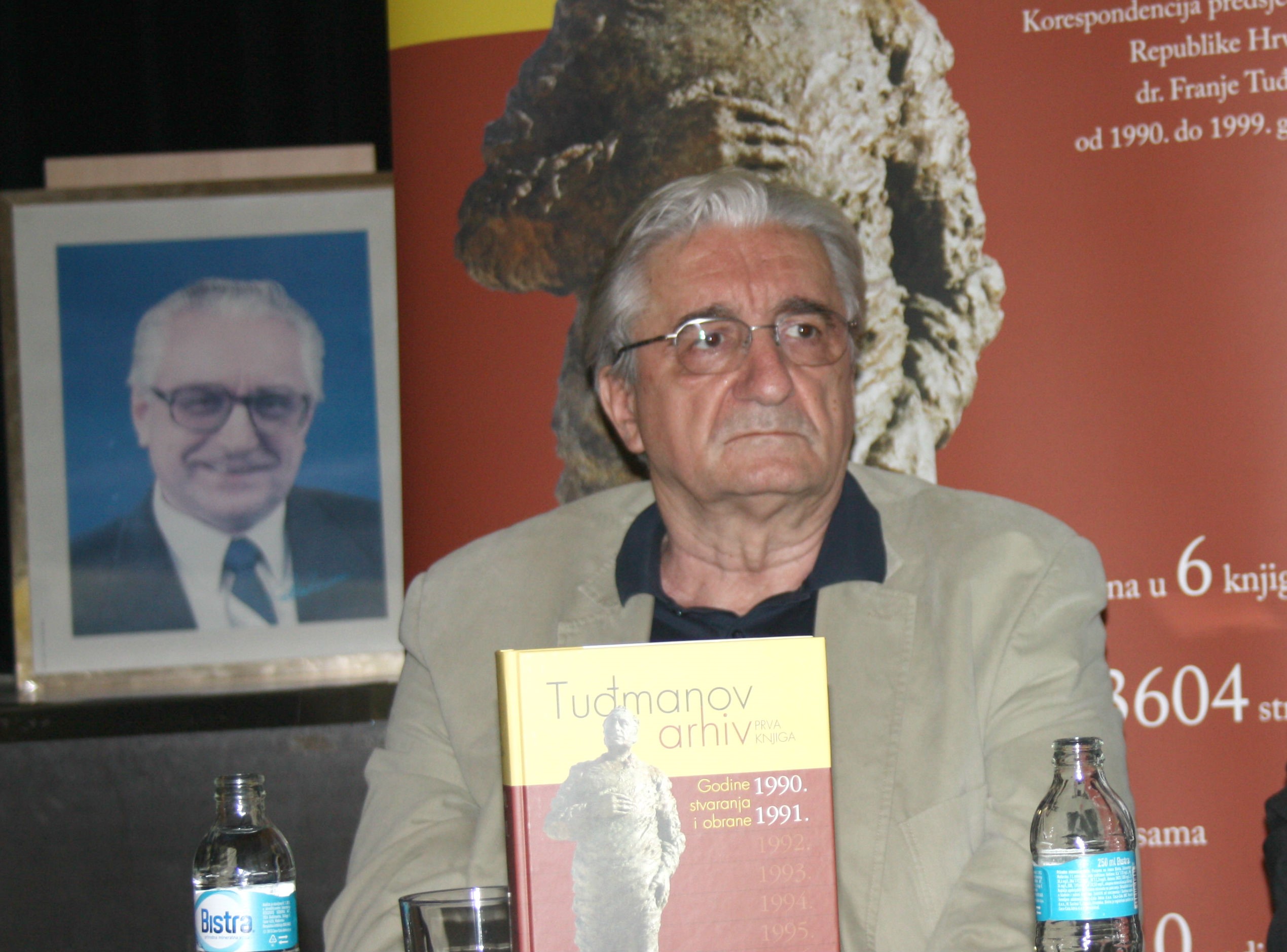 Miroslav Tudman © HDZ
Miroslav Tudman © HDZ
He took part in the Croatian War of Independence and in 1992 Miroslav Tudman became the head of the Centre for Strategic Research. He took up the role as the deputy head of the National Security Office before founding and leading the first Croatian Intelligence Agency (Hrvatska izvještajna služba, HIS). In 1998, Miroslav Tudman became a tenured professor at the Faculty of Philosophy where he had studied.
Miroslav Tudman had dallied with politics since before the war, but it was only after the passing of his father – who died while in office – that they became a more consuming affair for him. He flitted between running as an independent candidate, within fringe parties and as a member of HDZ, the party to which his father belonged. His longest duration with any party was from 2011 and 2021, during which he was a member of HDZ.
At the time of his death, he was a member of the Croatian parliament, head of the Parliamentary Delegation to the NATO Parliamentary Assembly, a member of the Committee on Defence, Internal Policy and National Security, War Veterans and Inter-Parliamentary Cooperation.
Bearing a very close resemblance to his father, Miroslav Tudman was named after Croatian writer Miroslav Krleža who his father adored at the time of his firstborn child.
Prime Minister Andrej Plenković said that he received the news of Miroslav Tudman's death with sadness.
"It is with great sadness that I received the news of the departure of Prof. Miroslav Tudman, PhD, a dear colleague, friend and member of the Croatian Parliament, son of the first Croatian President Franjo Tudman, a prominent politician and a scientist dedicated to protecting national interests," he wrote on Twitter. "In these sad and painful moments, for the Tudman family, I express my sincere condolences and sympathy, on behalf of the government and myself."
For the latest travel info, bookmark our main travel info article, which is updated daily.
Read the Croatian Travel Update in your language - now available in 24 languages
Number of Deaths 13% Higher Due to COVID
ZAGREB, 29 January, 2021 - Croatia registered 13.2% more deaths in March-December 2020, during the COVID-19 pandemic, than at the same time in 2019, the national statistical office said on Friday, adding that year on year the number of deaths in December alone jumped by 77.3%.
In 2020, 8.3% more deaths (+4,350) were registered than in 2019. From March through December, the number of deaths was up by 13.2% (+5,523).
The largest number of deaths in Croatia in a month was registered last December, a total of 7,395, which was up by 77.3% from December 2019 (+3,225).
The second largest number of deaths in a month was registered in January 2017, a total of 6,512, while the third was in January 2019 (5,504).
January and March have been the other months with the most deaths but they have not exceeded 5,500.
Nenad Bakic: Why Has the Virus Become So Deadly in the New EU Countries?
December 20, 2020 – The European Union has so far recorded over 300,000 deaths caused by the coronavirus pandemic, with the second wave being 50 percent more deadly than the first one. It is easily possible that the total number will exceed half a million by the time the pandemic is brought under control. Mathematician, investor, and analyst Nenad Bakic explains why for Index.hr.
In terms of the number of deaths per million inhabitants, the new members of the European Union, the countries of the "new European Union", namely the former socialist countries – including, unfortunately, Croatia – are in the lead. Some of them have several tens of times more deaths in the second wave than in the first.
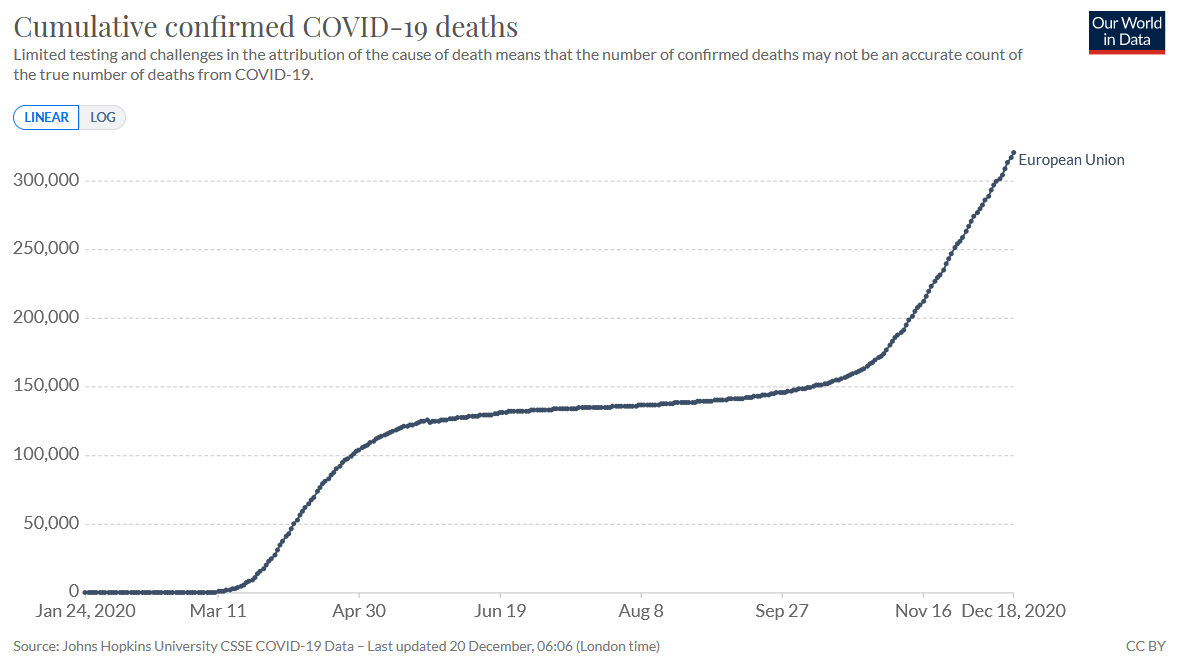
Confirmed cases of death due to coronavirus in the European Union / Source: ourworldindata.org
What is happening? Why did the virus in the second wave become so deadly in the new European Union members? By studying this example, we can learn a lot about the pandemic in general.
- The countries of the New European Union (NE), 11 ex-socialist countries, did very well in the first wave, with only one of them among the 13 most-affected. All the governments of these countries attributed the success to themselves. In some countries like Croatia, it was done by gurus who considered themselves ideologues of barbaric imprisonment or, as they ignorantly called it, "quarantine".
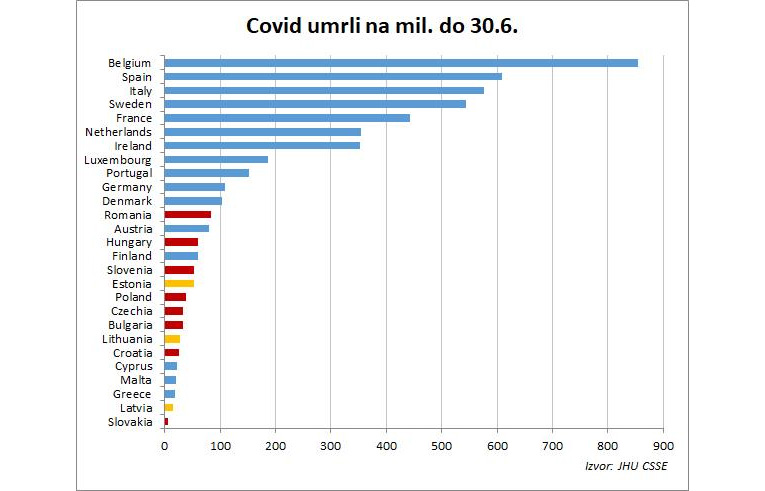
Graph 1. Coronavirus deaths per million, until June 30, 2020. Source: Index.hr / JHU CSSE
They are marked in red on the first graph. A lighter shade highlights the small Baltic countries because something strange is happening there, but it doesn't matter. It is the same when we look at it without this separation.
What is the probability that the NE countries were so much more successful in their will than the older, smarter, and more experienced brothers? Maybe it's something else.
- In the second wave, NE countries were significantly more affected, as we can see in the second graph.
Graph 2. Coronavirus deaths per million, from July 1, 2020 until December 18, 2020. Source: Index.hr / JHU CSSE
Out of the top 8 countries, they occupy seven positions. What is the probability that they are so much more unsuccessful than other countries by their own will? Very small.
Of course, it's easy to recognize a "return to the core value" here – as the virus does what it wants, most countries end up converging to a similar number of deaths. Graph 3 shows the coefficient of variation, which is the standard measure of a set's scatter.
Graph 3. Coefficient of variation, deaths from coronavirus in EU countries per million. Source: Index.hr
Here we can already conclude that the performance of the NE countries as a group has nothing to do with their governments' competencies. The probability that a group with its ability is far above average and then that same group is far below average, especially in a situation like this where the virus spreads across the continent without knowing the boundaries, is zero. Of course, some individual countries are better or worse, both in epidemic management and in treatment.
- But things are only now becoming very interesting. The number of deaths in the second wave not only offset the one from the first wave but also shifted it. The NE countries as a group are now considerably worse than the rest, as we can see in Graph 4.
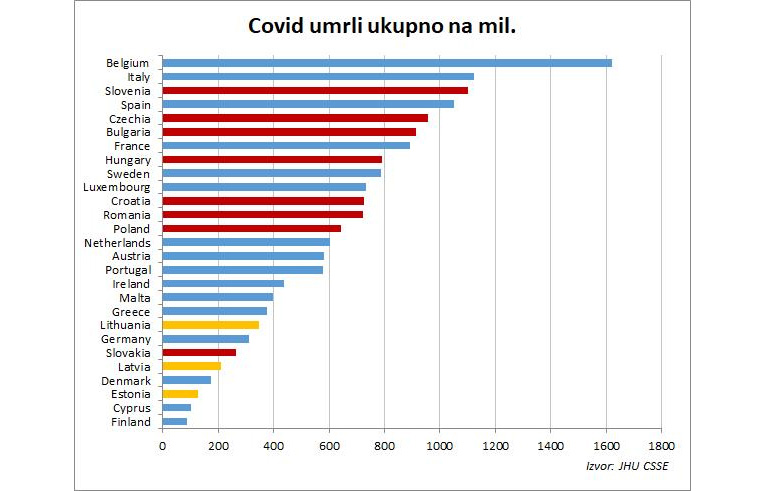
Graph 4. Total coronavirus deaths per million. Source: Index.hr / JHU CSSE
They occupy eight of the first 13 places. If we exclude the small Baltic countries, only Slovakia remains in the lower half, but the situation deteriorates quickly, and it could easily get to the upper half.
As we can see, there is something special about the small Baltic countries and Finland. We still don't know what, and it doesn't matter for this analysis either. If we single out those countries, things become clearer, but the analysis works without them.
- What is the explanation? It can be the following:
- A. It has been shown that COVID-19 is highly seasonal. In NE countries, the epidemic came later in late winter 2020 and therefore could have done much less damage by the time spring came. This is undoubtedly the case with Croatia, as you can see in Graph 5: the reproductive factor R fell below 1 already before the end of March, before the measures were introduced on March 23 in Croatia and could take effect.
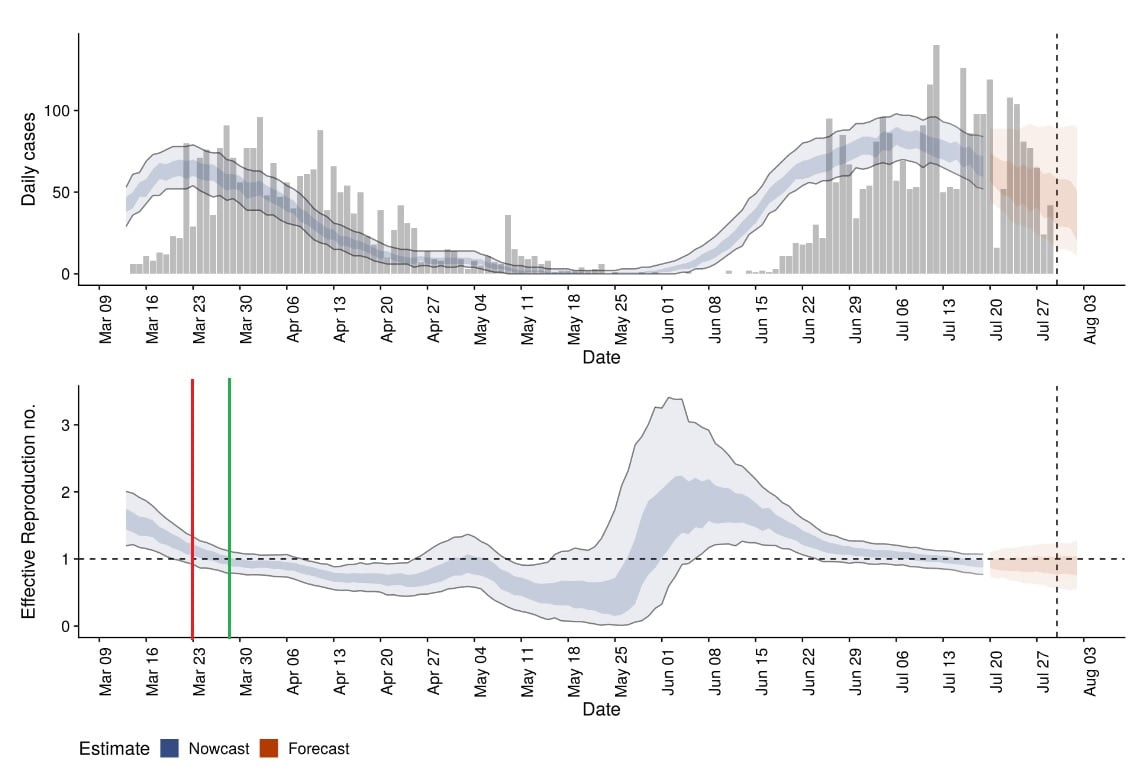
Graph 5. Source: Index.hr
The introduction of a movement prohibition and a drop in R below 1 are marked with a red and green line. An international group of the London School of Health and Tropical Medicine made this calculation, in which a member of the Croatian Scientific Council also participated. Somehow they later forgot to let us know that R had already fallen below 1 even then. However, at the beginning of the epidemic, everything was explained with its help, which advanced countries are doing now. From a time perspective, all of this is now obvious, and that first wave seems completely benign compared to this one now.
But let's remember the psychosis in which we lived then when the concept of "Camp Croatia" with GPS tracking and leaving the house every third or fifth day was already announced when the epidemic was already falling. Inexperienced and impressed by the violent measures, we thought they helped.
But why did the epidemic come later? Here I think the key is in international connectivity. I used an imperfect DHL connectivity index and got a great explanation of the difference, which can be seen in the following chart.
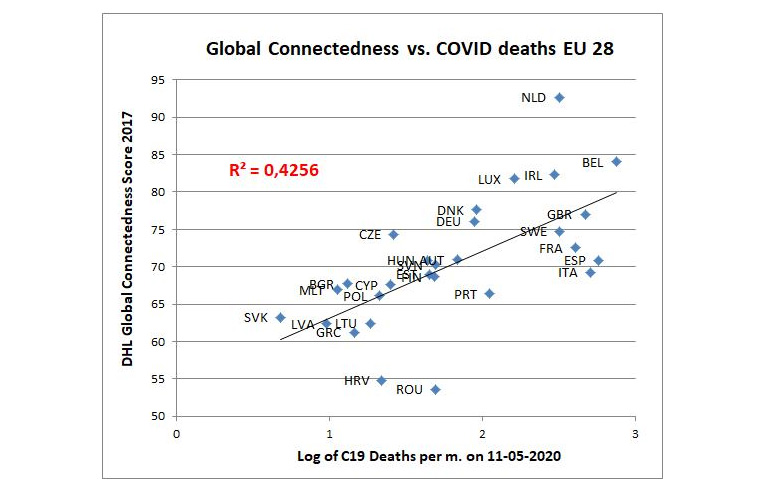
Graph 6. Source: Index.hr
Interestingly, even such an imperfect measure of connectivity explains so much of the variation. As we know, the most affected countries are also the most connected: Italy – densely populated Lombardy and workers from China; Italy, France, Spain – tourism; Belgium – the center of the European Union and others; Sweden – far more connected than its neighbors; and a million Swedes went on school holidays abroad in the last week of February.
- B. The first wave was actually far stronger than it seems now because we tested and hunted cases much less. Many countries found that their dark number (undiscovered cases) was several tens of times higher than those found. In our country, depending on the interpretation of the data, 50 to 80 times, in Denmark 80 (at some point). Now the dark number is probably 5 to 10 in most countries, and the current maybe even just 3 because as more and more people are being tested, and more and more people have been exposed to the virus, the significant dark number has nowhere to hide.
Therefore, most of the countries of old Europe became infected in the spring, a part of the population gained immunity, and significantly more than in the NE, which we cannot see well if we look only at the cases.
- C. It is now quite clear that strongly seasonal is not only an epidemic of SARS-CoV-2 virus but also COVID-19 disease. Clinical pictures are, on average, far more difficult now than a month or two ago. Mortality rates in most EU countries have doubled in just a month or two, meaning twice as many people die among those confirmed infected. It is also the insight of an international group of scientists in which Croatians Gordan Lauc, Alemka Markotić, Dragan Primorac, and others also participated. At first, it was controversial, but now it is generally accepted. Those infected in spring (more in the old than in the NE) had a much better chance of surviving.
- D. One explanation indeed lies in the quality of hospital systems. I believe richer countries have more resources. For example, expensive HFOT devices save lives better than respirators (Croatia has now procured a larger quantity).
- E. Other variables could be considered, such as previous flu seasons, the percentage in the population over 80, or the people in nursing homes. Still, I believe they would indicate a lower expected number of deaths in the NE (but I did not check the data).
In general, the NE countries, including Croatia, were not particularly unprepared for the supposedly expected strong second wave. Let's look at how strength and early outbreak surprised even the most advanced countries, with entirely different strategies: from Germany through Denmark and the Netherlands to Sweden. Remember that in almost all countries, politicians said "let's just wear masks, and we won't need any special measures," then "let's introduce some measures, and we certainly won't need lockdown," and so on. Now we have reached a solid lockdown in almost the entire Union.
Even Germany, the first wave model, is experiencing a real drama after a failed soft lockdown that was supposed to ensure a peaceful Christmas. Denmark and some other countries are already overtaking us in terms of the number of infected. It is not impossible for Germany to overtake us, even in terms of deaths.
In some countries, a third or "second B" wave is already being born, under the influence of winter COVID-19. R is contextual, and even if it falls below 1, under the influence of various circumstances, it can return over 1. It seems that our second wave peak was delayed by merging with that (surprising to all) the third wave.
Conclusion
- The development of the epidemic is mostly beyond the reach of the authorities.
- Countries with stronger measures do not fare better than those with weaker ones. For example, Slovenia is the worst in this group, despite introducing extreme measures before the epidemic escalated.
- The introduced travel ban is not useful. The inspiration for it was the spring ban, which was considered our most important measure, and obviously did not affect the epidemic.
- On the whole, we are not somewhat more unsuccessful than others. Indeed, although some have had significantly stronger measures for longer (this is one group we can compare ourselves to, and the other is our neighborhood shown in Graph 7, and only Serbia is better than us), we should consider any success or failure relatively. It is known that some measures work, such as banning gathering, maintaining physical distance, washing hands, ventilation, etc. The introduction of measures should be proportionate to the goal because the disproportionate introduction of measures has severe negative consequences for society. Countries that introduce brutal and unnecessary measures (there are arguments that some brutal measures even encourage an epidemic) can also cause significant collateral damage to their populations' lives and health.

Graph 7. Showing data from October 6, 2020 to December 19, 2020. Source: ourworldindata.org
Let's not forget, the goal in epidemic control is to bring the reproductive factor R below 1, and "zero-covid" strategies have long since been abandoned. Fortunately, in Croatia, R is currently significantly below 1. Let's hope that the data on the epidemic we have are credible and that such a situation will persist.
Of course, the main goal is to save as many lives as possible, although we are often helpless with the virus. Therefore, it is necessary to adhere to epidemiological measures with enhanced protection of vulnerable groups.
To read more about coronavirus in Croatia, read TCN's dedicated page.
Croatia Reports 117 New Coronavirus Cases, 3 Dead
ZAGREB, September 7, 2020 - Over the past 24 hours 117 new coronavirus cases and have been registered in Croatia and three persons have died, the national COVID response team said on Monday.
The number of active cases is 2,614, including 307 patients in hospitals, 19 of whom are on ventilators, the team said in a press release.
Since February 25, when the first case was registered in Croatia, 12,081 persons have been infected with SARS-CoV-2, 201 of whom have died, while 9,266 have recovered.
Currently 8,819 persons are self-isolating. To date 193,153 tests have been conducted, including 1,793 in the past 24 hours.
For the latest travel info, bookmark our main travel info article, which is updated daily.
Read the Croatian Travel Update in your language - now available in 24 languages


